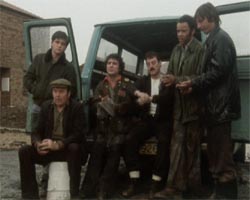 In the late-’70s Liverpool of fast-rising unemployment, a gang of tar layers strike out in an old transit for a job laying the road in front of a new housing development in Middlesborough. Along the way, one of their number, Yosser Hughes, comes into contact with a pair of gypsies offering a little non-union work laying the road to a nearby farm. In a seedy hotel that night, while young Kev tries unsuccessfully to take advantage of the ‘masseur’ operating in the next room (and getting set up by the other lads in the process) Yosser drunkenly conceives his own tarmacadam company, ‘Tar La’, and despite their best judgement, all the others, save Kev and foreman Dixie, go along with it.
In the late-’70s Liverpool of fast-rising unemployment, a gang of tar layers strike out in an old transit for a job laying the road in front of a new housing development in Middlesborough. Along the way, one of their number, Yosser Hughes, comes into contact with a pair of gypsies offering a little non-union work laying the road to a nearby farm. In a seedy hotel that night, while young Kev tries unsuccessfully to take advantage of the ‘masseur’ operating in the next room (and getting set up by the other lads in the process) Yosser drunkenly conceives his own tarmacadam company, ‘Tar La’, and despite their best judgement, all the others, save Kev and foreman Dixie, go along with it.
An increasingly farcical game of cat-and-mouse ensues, with the gang trying desperately to sneak off from under Dixie’s nose in order to complete the two jobs at once. Unfortunately, their boss, the devoutly unprincipled McKenna (David Calder) swoops in on them in his helicopter, and summarily fires the lot of them on the spot with disdainful relish. Finally, it dawns on them their new gypsy compadres have stitched them up something rotten, and after Yosser goes after them in a desperate but doomed car chase (in Transit vans!) they return, forlornly, to the ‘Pool, and the dole office – thus setting the scene for the later Boys from the Blackstuff series.
Like that series, this play has a reputation for being dour and depressing, and while the ultimate message of both is hardly ‘feel good‘, this is far from being a protracted wallow in the despair of those at the bottom of the pile. The characters are all marvellously drawn. Foreman Dixie (Tom Georgeson), overprotective of his desperate-to-come-of-age son (writer Alan Bleasdale‘s nephew Gary); the ailing but still proudly principled George (Peter Kerrigan); Loggo (Alan Igbon), applying his own set of scruples to fit the main chance; the honest-yet-naïve Chrissy (Michael Angelis); and of course the borderline psychotic Yosser (Bernard Hill), determined to make a name for himself yet quite clearly completely incapable of sufficiently relating to other people in order to do something about it. He can lead a gang of lads, though, in a social sense – the scene on the way to Middlesbrough where they give a lift to plain student Janine Duvitski, whom Yosser starts mercilessly laying into, shows his quick tongue (‘wit’ might be stretching things a bit) and his short fuse in equal measure – Duvitski’s parting shot ‘Your wife must give you hell!’ results in the surreal shot of the trademark Hughes repeated headbutt on the van doors as it drives away.
There’s humour aplenty in the film, all of it firmly employed to feed the characters – the magnificently believable double act of Sean Lynch and Alan Lake as the two gypsies; the on-site ribbing of foreman Dixie, the malevolent clerk of works, and ‘the lad’ (especially Loggo convincing the boy that Hermasetas are a powerful aphrodisiac); as well as revealing little touches cribbed from urban folklore, like the ferrets, pigeons and geese being taken along with the lads in the van, and McKenna opportunistically pulling up his Merc alongside an unguarded generator with a view to sneakily towing it away.
Presented as a Play for Today special, the response to this play was so great that the BBC commissioned Bleasdale to expand each character into a separate drama. The first of these, The Muscle Market, featured Pete Postlethwaite replacing Calder as the owner of the building contractors, and Alison Steadman. It went out under the Play for Today banner in 1981 as a stop-gap measure while Bleasdale finished the other five, which were made by Philip Saville on (for the most part) the new, lightweight video OB cameras, and shown as the drama series The Boys From The Blackstuff. The rest is history.




















Tony Brown
December 7, 2014 at 2:17 am
loved this show, should make more like this, updated of cause, come on Alan .